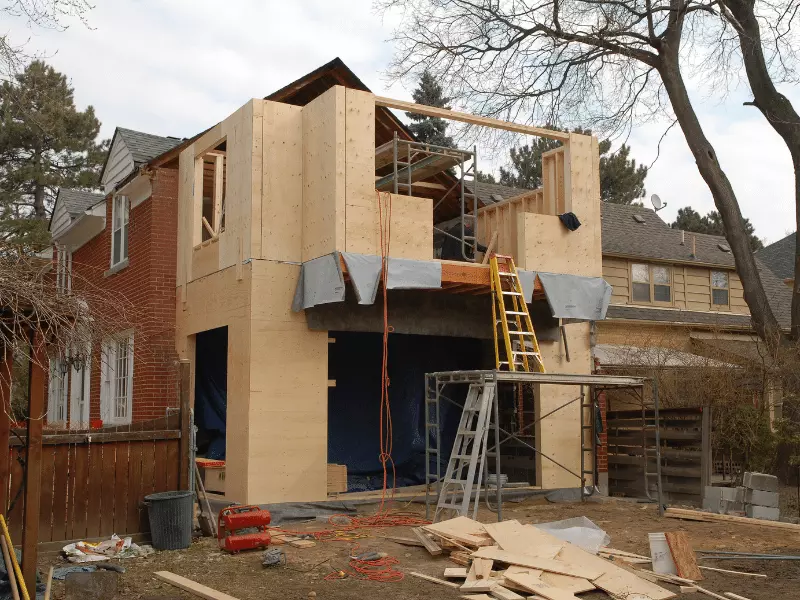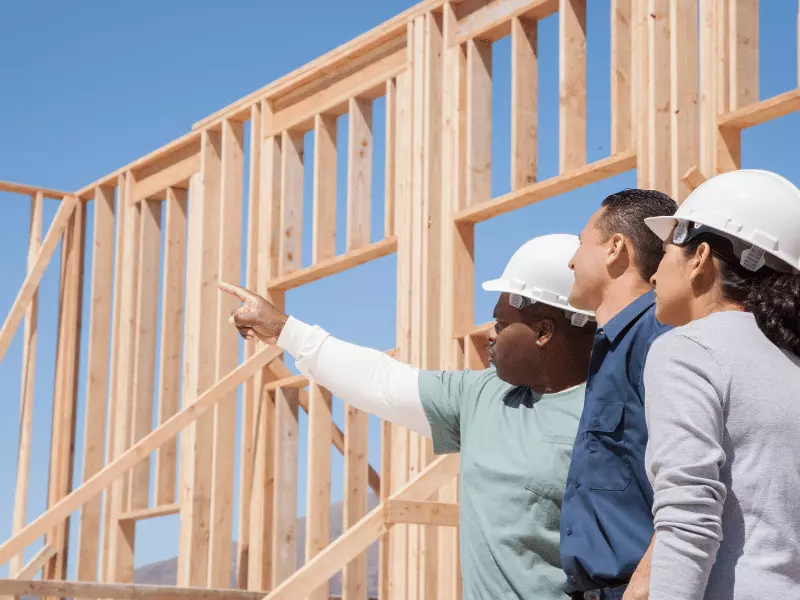
Home addition projects come with a lot of uncertainty by default. What kind of addition to opt for, what is the process to get it done, whom to work with to get it done up to your level of satisfaction, what are the costs & regulations involved, will it add value to your home, and so on.
And while the internet can be a great source to find answers to your specific questions, more often than not, you'll end up finding way too much information to answer your question easily, and you're not sure whether the source is credible.
As one of the leading home building companies in Western Massachusetts, we've worked on enough home addition projects over the past twenty years to consider ourselves well versed on the subject. That's why we've put together this article to hopefully answer some of the most common questions we've been asked by our clients.
Let's start with the biggest question of all,
Should I add an addition to my home?
There are two ways to answer this question, but both lend themselves to the positive side of the question. If you're not planning on moving out of the house for at least 5-10 years and need that additional space, then a home addition is a good idea. The monetary bump to your home's value notwithstanding, a well-designed and well-constructed addition can be enjoyed by the entire family for years to come.
Another way to look at this train of thought is to consider what you would need to do to your home to get the same amount of space without an addition. Most often, that would entail a complete gut and reconfiguration of your home, which can be just as costly and disruptive as an addition.
In short, if you need more space and want to stay in your home, an addition is a great option. Alternatively, if you're not looking at staying in your house for long and are mainly considering an addition to bumping the resale value up, then the kind of addition and how well it's executed can have a huge impact on the resale value of the property.
What does a home addition typically cost?
This is a loaded question as the answer depends on the size, scope, and complexity of the project. A small bathroom or mudroom addition can cost as little as $20,000 while a more significant family room or master suite addition can easily top $100,000. As with any home improvement project, we recommend getting a few estimates from reputable contractors to get a better idea of the costs involved. If money is an issue, then there are plenty of options to consider, from having a frank discussion with your builder about what is possible within your budget (and scaling it up or down to suit), construction loans, re-finance loans, and so forth.
Should you DIY or Hire a Contractor?

The answer to this question is a resounding no unless you are an experienced contractor yourself. Even if you're just considering tackling a small part of the project, it's worth bringing in professionals to do the bulk of the work and offering their expertise along the way.
Not only will this minimize the risk of something going wrong (and potentially costing you more in the long run to fix), but it also means that the job will likely get done faster and to a higher standard. Additionally, most building departments will require that any work on your home, no matter how small, be completed by a licensed contractor. So unless you are one yourself, it's best to hire someone who is.
Lastly, while we've spoken at length about how to find the right home building contractor as well as what are the different types of contractors involved in the home building and home addition process, its critical to find a contractor who has the experience and comes with all the necessary certifications, qualifications, and customer testimonials.
When is the best time to add an addition to my home?
The short answer here is that the best time to add an addition to your home is whenever you need the extra space and can afford it. In terms of weather, most contractors will be able to work through all four seasons, although winter additions can be more challenging due to the shorter days and potential for bad weather.
That said, if you're planning a larger addition, it may be worth considering starting the project in late spring/early summer to take advantage of the longer days and nicer weather. Of course, there are always exceptions to this rule, so if you have your heart set on a particular time of year for your addition, be sure to discuss it with your contractor beforehand to see if it's feasible.
With the most common questions out of the way, let's take a look at the most common kinds of home additions.
Different Kinds of Home Additions
Kitchen Addition
A kitchen addition is one of the most popular types of home additions, and for good reason. Not only does a new kitchen add value to your home, but it also provides much-needed extra space, whether you're looking to expand your current kitchen or add a second one. When it comes to kitchen additions, there are a few things to keep in mind. First, you'll need to decide on the size and layout of your new kitchen. This will be largely determined by the amount of space you have to work with as well as your budget.
Next, you'll need to think about the style of your kitchen. Do you want it to match the rest of your home or go for a more contemporary look? This is entirely up to you, but it's something worth considering before you start the project. Lastly, you'll need to decide on the finishes. Everything from the countertops and cabinets to the flooring and appliances will need to be selected, so it's worth taking your time to make sure you're happy with everything before you start the project.
Mudroom Addition
A mudroom may provide several advantages to your house. They're an excellent location to store shoes, coats, and bags, as well as an additional way of entering the house without dirtying up the main entrance. They're simple to clean, so they're ideal for dogs with muddy paws or kids who have dirty boots.
Mudrooms can be as simple or as elaborate as you like, but there are a few things to keep in mind when planning one. First, you'll need to decide on the size and layout. This will be determined by the amount of space you have available as well as how many people will be using the mudroom regularly. You will also have to factor in things like storage space and even a small sink for washing up (if needed). The cost of a mudroom renovation is determined by several factors, including size and materials employed.
Sunroom Addition
A sunroom is a great way to add extra living space to your home without breaking the bank. Not only do sunrooms provide a bright and airy place to relax, but they also offer stunning views of the outdoors. A sunroom brings a lot of light into the house, whether you're considering enclosing an existing porch or adding to your front entryway.
Sunrooms are available in a range of styles, including three-season sunrooms, four-season sunrooms, and solariums. Three-season sunrooms are typically the most affordable option and can be used year-round in milder climates. Four-season sunrooms, on the other hand, are designed to be used year-round and offer more insulation and features (such as a fireplace) to make them comfortable in colder weather. Solariums, while similar to sunrooms, are typically built with all glass walls and a glass roof for maximum light.
Garage Addition
A garage addition is a great way to add extra storage or living space to your home. Garages can be used for a variety of purposes, from housing vehicles and storing tools and equipment to creating a workshop or studio space. The cost of a garage addition will vary depending on the size and complexity of the project. A small single-car garage will cost less than much larger garage spaces for additional cars, bikes, and other equipment. Add to this the storage and equipment needed to make a garage fully functional and the budget can quickly rise depending on the situation. It's best to have a firm idea beforehand to keep costs within reason.
Bathroom Addition
A bathroom addition is a great way to add extra living space to your home. Bathrooms can be used for a variety of purposes, from providing a place to get ready in the morning to relaxing in the evening. The cost of a bathroom addition will vary depending on the size and complexity of the project.
Bedroom Addition
A bedroom addition is a great way to add extra living space to your home. Bedrooms can be used for a variety of purposes, from providing a place to sleep to relaxing in the evening. The expense of a bedroom extension will vary depending on the scope and intricacy of the job. Regardless of the size and your budget, an additional bedroom for extended family members or guests is a major boost to the overall value of your home.
Home Office Addition
We've seen a lot of requests for home office additions ever since the COVID-19 pandemic forced a lot of people to work from home. A home office is a great way to create a quiet, productive space for your work, that's also easily accessible to the rest of the family if needed. When planning a home office addition, there are a few things to keep in mind. While available space is the first thing to consider, you will also need to factor in things like lighting, furniture, storage, technology, etc.
Conclusion
Adding any type of space to your home comes with a certain amount of cost and planning. But, ultimately, the return on investment is well worth it. Not only will you be able to enjoy the extra living space, but your home's value will increase as well. If you're thinking about adding an addition to your home, contact us today. We'll help you plan and design the perfect space for your needs.
